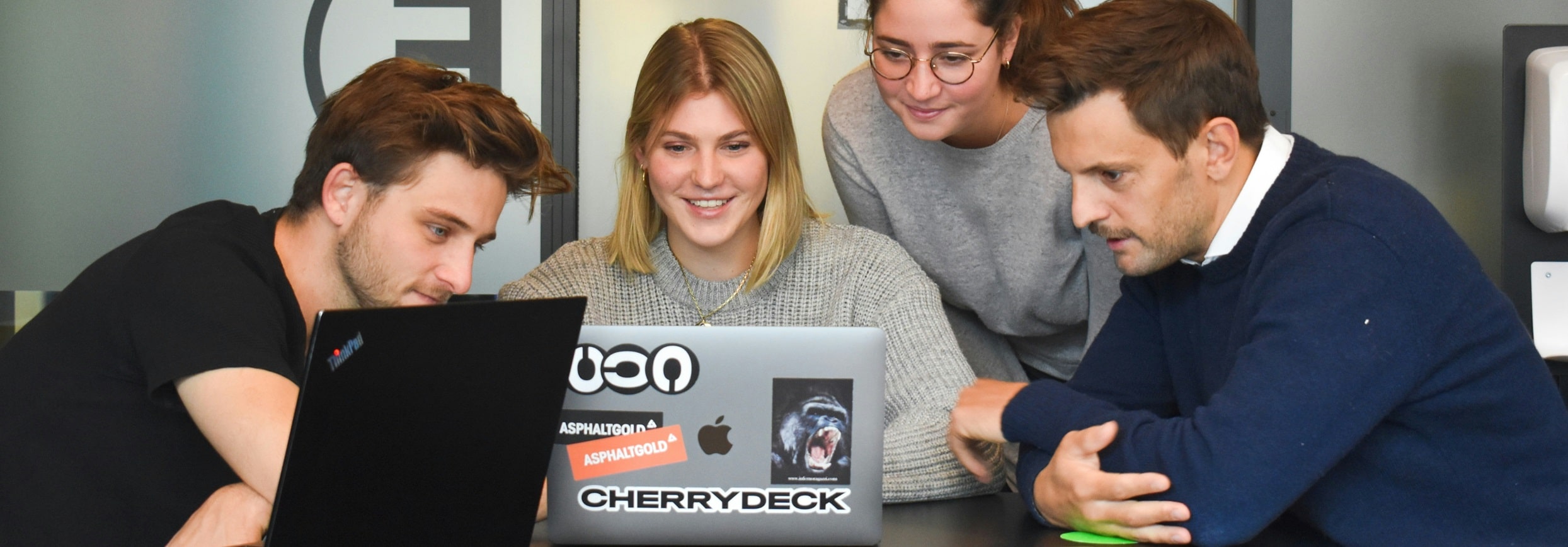Improve
project management with clients
How can you improve project management with your clients? The success of a project often hinges on the quality of the relationship between the service provider and the client.
However, in reality, collaboration can sometimes suffer due to misunderstandings, lack of communication, or inadequate tools.
The result: delays, tension, frustration on both sides—and sometimes even project failure.
Fortunately, there are now concrete methods and tools available to improve project management by truly involving your clients, from the initial briefing to final delivery. In this article, we share best practices to strengthen collaboration, streamline communication, and ensure shared satisfaction.

Laying a solid foundation from the start
Even before a project begins, it’s essential to establish a clear framework with your client. This first step sets the tone for the entire collaboration.
Define objectives together
A well-scoped project is off to a good start. Make sure you clearly understand your client’s expectations: what are the goals? Success criteria? Technical or budget constraints? All this information should be formalized in a structured brief, validated by both parties.
Clarify timelines and milestones
A precise schedule with deadlines for each step (kick-off meeting, intermediate deliverables, validations, final delivery) prevents delays and reassures the client about project progress.
Choose the right tracking tools
From the outset, implement a shared project management tool. A collaborative platform like Acollab centralizes all project elements: files, tasks, messages, validations, etc. Result: everyone has access to the right information at the right time.

Establish smooth and regular communication
Most project roadblocks arise from a lack of communication. Clear, consistent, and transparent communication with your client is key.
Schedule regular check-ins
Organize regular follow-up meetings (weekly, biweekly, etc.). These meetings help track progress, adjust priorities, and address any questions or concerns the client may have.
Use asynchronous tools for daily exchanges
For daily communication, use a collaborative platform to avoid scattered emails. Acollab allows you to create discussion threads by topic, assign tasks, and comment on shared documents between service provider and client.
Be transparent in case of difficulties
Delays or unforeseen issues can happen. What matters is quickly informing the client, explaining the reasons, and proposing a solution. This transparency builds trust.

Actively involve the client in the process
An engaged client is more invested, more responsive, and generally more satisfied at the end of the project. Here’s how to involve them smartly.
Treat the client as a project team member
Provide them with access to the project management tool, showing real-time progress, ongoing tasks, and shared documents. This fosters co-construction and transparency.

Include them in the validation phases
Rather than delivering a final version without intermediate feedback, propose several validation phases. The client feels more in control of the project, and it’s easier to make adjustments if needed.
Collect feedback regularly
Encourage the client to provide feedback throughout the project, not just at the end. Early feedback is easier to integrate than late-stage revisions.

Structure tasks and responsibilities
An effective project relies on a clear division of roles, tasks, and responsibilities.
Create a detailed project plan
Outline a plan including:
- Major phases (kick-off, design, production, delivery)
- Expected deliverables for each phase
- Stakeholders involved
- Deadlines
On Acollab, you can structure projects with task lists, milestones, deadlines, and assignees.
Appoint a client-side contact person
Having a single point of contact on the client’s side simplifies coordination. They can centralize feedback, make decisions, and avoid endless back-and-forth.
Keep a record of decisions
Document decisions made during meetings or validations. This clarifies responsibilities in case of disputes and prevents misunderstandings.

Ensure complete tracability of exchanges and documents
How often are projects delayed because “the correct file wasn’t sent” or “the oral validation wasn’t confirmed in writing”?
Centralize all documents
All project-related files (briefs, designs, quotes, contracts, technical specs) should be stored in a shared space accessible to all team members and the client.
With Acollab, you can organize folders, version files, assign access rights, and create documents editable by both the team and the client.
Follow topic-specific discussions
A tool like Acollab allows for discussion threads by topic, deliverable, or project phase. This way, no exchange is lost—even weeks later.

Archive validations
Keep a record of all validations (designs, mockups, quotes, schedules). This avoids backtracking and strengthens the project’s legal security.
Anticipate risks and manage the unexpected
No project goes exactly as planned. What matters is anticipating challenges and having contingency plans.
Identify risks early
During scoping, identify potential risks: delays, reliance on third parties, missing data, etc. Define action plans for each.
Build slack into the schedule
Avoid tight schedules. Include buffers to absorb unforeseen events without jeopardizing the whole project.
React Quickly to Problems
When issues arise, inform the client quickly, propose a clear action plan, and adjust the timeline if needed. Being responsive is highly appreciated.
Improve project management through lasting relationships
Project management tool isn’t just about delivering a product. It’s about building a long-term relationship based on trust.
Conduct an end-of-project review
At the project’s end, offer a debrief with your client:
- What went well?
- What could be improved?
- What lessons can be applied to future projects?
This review is invaluable for strengthening future collaboration.

Offer post-delivery support
Provide added services after project completion: support, maintenance, training. This reassures the client and extends the relationship.
Use a suitable collaborative platform: Acollab's advantage
The right tool makes all the difference. A platform like Acollab lets you centralize every project aspect in a shared space with your client.
Acollab’s key features for client project management
- Centralized document storage
- Task management with deadlines and assignees
- Shared planning
- Space for communication and discussions
- Access rights management
- Secure hosting in France
It’s the ideal tool to professionalize your projects, streamline communication, and offer your clients a high-quality collaborative experience.

Conclusion
How to improve project management with clients ? Improving project management with clients isn’t just about methodology—it’s about relationship quality, clear communication, and structured information. By genuinely involving your clients and providing transparency and tools like Acollab, you create a foundation of trust that boosts project success—and long-term loyalty.
